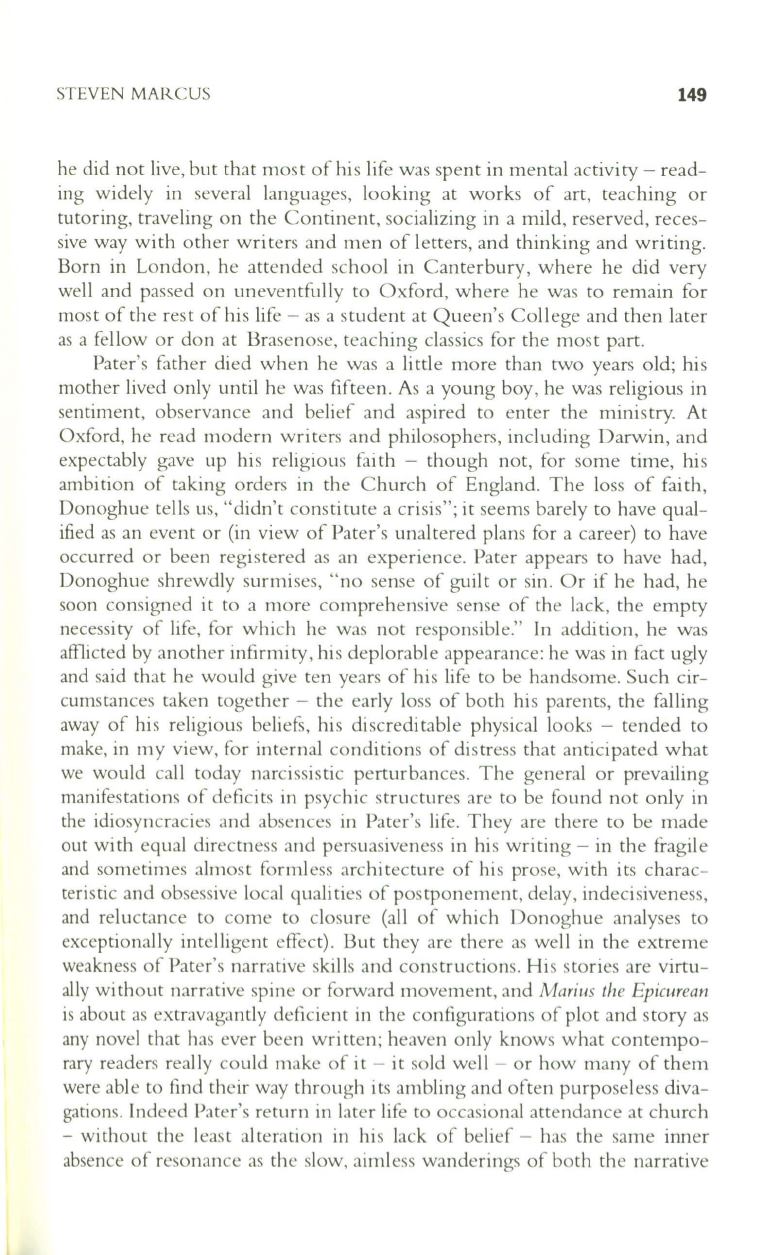
STEVEN MARCUS
149
he did not live, but that most of his life was spent in mental activi ty - read–
ing widely in several languages, looking at works of art, teaching or
tutoring, traveling on the Continent, socializing in a mild, reserved, reces–
sive way with other writers and men of letters, and thinking and writing.
Born in London, he attended school in Canterbury, where he did very
well and passed on uneventfully to Oxford, where he was to remain for
most of the rest of his life - as a student at Queen's College and then later
as a fellow or don at Brasenose, teaching classics for the most part.
Pater's father died when he was a little more than two years old; his
mother lived only until he was fifteen. As a young boy, he was religious in
sentiment, observance and belief and aspired to enter the ministry. At
Oxford, he read modern writers and philosophers, including Darwin, and
expectably gave up his religious faith - though not, for some time, his
ambition of taking orders in the Church of England. The loss of faith,
Donoghue tells us, "didn't constitute a crisis"; it seems barely to have qual–
ified as an event or (in view of Pater's unaltered plans for a career) to have
occurred or been registered as an experience. Pater appears to have had,
Donoghue shrewdly surmises, "no sense of guilt or sin. Or if he had, he
soon consigned it to a more comprehensive sense of the lack, the empty
necessity of life, for which he was not responsible." In addition, he was
afflicted by another infirmity, his deplorable appearance: he was in fact ugly
and said that he would give ten years of his life to be handsome. Such cir–
cumstances taken together - the early loss of both his parents, the falling
away of his religious beliefs, his discreditable physical looks - tended to
make, in my view, for internal conditions of distress that anticipated what
we would call today narcissistic perturbances. The general or prevailing
manifestations of deficits in psychic structures are to be found not only in
the idiosyncracies and absences in Pater's life. They are there to be made
out wi th equal directness and persuasiveness in his wri ting - in the fragile
and sometimes almost formless architecture of his prose, with its charac–
teristic and obsessive local qualities of postponement, delay, indecisiveness,
and reluctance to come to closure (all of which Donoghue analyses to
exceptionally intelligent effect). But they are there as well in the extreme
weakness of Pater's narrative skills and constructions. His stories are virtu–
ally without narrative spine or forward movement, and
Marius the Epicurean
is about as extravagantly deficient in the configurations of plot and story as
any novel that has ever been written; heaven only knows what contempo–
rary readers really could make of it - it sold well - or how many of them
were able to find their way through its ambling and often purposeless diva–
gations. Indeed Pater's return in later life to occasional attendance at church
- without the least alteration in his lack of belief - has the same inner
absence of resonance as the slow, aimless wanderings of both the narrative


